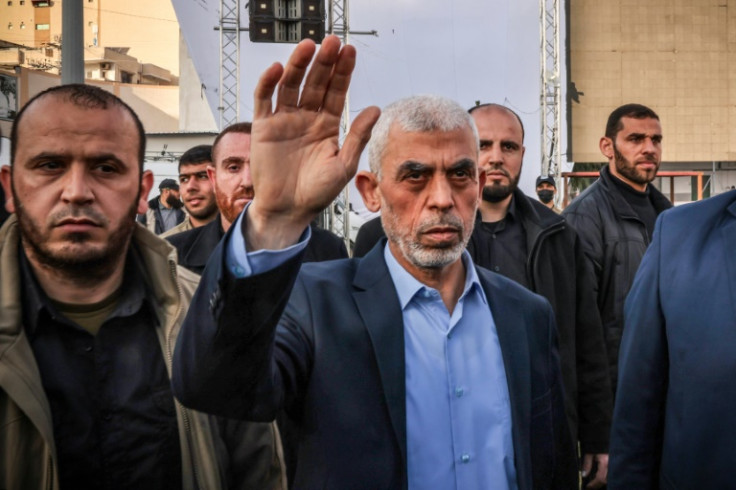Who Is Yahya Sinwar: New Hamas Leader Is Reportedly Hiding In Gaza's Underground Tunnels

Following the death of Hamas leader Ismail Haniyeh at his guesthouse in Iran earlier this week, the Palestinian Sunni Islamist political and military organisation has officially named Yahya Sinwar as its new leader. As reports emerge about Sinwar's involvement in the infamous October 7 attacks in Israel by Hamas, he has recently stated—through his spokesperson Osama Hamdan—that ceasefire talks with Israel will continue.
A Background of Yahya Sinwar
Before his recent promotion to the Hamas leadership as the chairman of the Hamas Political Bureau, Yahya Sinwar had been the Hamas leader in the Gaza Strip since February 2017. As a founding member of Hamas, Sinwar also served as the group's former head of the intelligence service.
Sinwar spent 23 years in Israeli prisons, serving four life sentences for attempted murder and sabotage until his release in a 2011 prisoner exchange for Israeli soldier Gilad Shalit. A former prison interrogator described him as "1,000% committed and 1,000% violent, a very, very hard man."
Upon his release, Sinwar swiftly returned to militancy, declaring that the only way to rescue Israeli detainees was to capture Israeli soldiers. This action bolstered the group's leadership under Sinwar, whose appointment to lead Hamas's political arm cast further doubt on the possibility of a ceasefire agreement being reached.
In May 2021, Sinwar survived an alleged assassination attempt by Israeli forces when an air strike struck near his home. There were no immediate reports of deaths or injuries, and Sinwar appeared in public a week later, challenging the then Israeli Minister of Defence to assassinate him within 60 minutes.
Reaction to Sinwar's Leadership Appointment
Yahya Sinwar has been designated as a terrorist by the US government since 2015. Hamas and its military wing, the Izz ad-Din al-Qassam Brigades, are designated as terrorist organisations by the United States, the European Union, and other countries. Earlier this year, Karim Khan, the International Criminal Court (ICC) prosecutor, announced plans to request an arrest warrant for Sinwar on charges of war crimes and crimes against humanity.
"In electing Sinwar to head Hamas, the organisation lays to rest any differences between external and internal leaders and whatever illusions of moderation existed to reveal its true face," wrote Aaron David Miller, a senior fellow at the Carnegie Endowment.
Israeli military spokesperson Rear Adm. Daniel Hagari told Saudi-owned Al-Arabiya television, "There is only one place for Yahya Sinwar, and it is beside Mohammed Deif and the rest of the October 7 terrorists. That is the only place we're preparing and intending for him."
Ceasefire Talks and Challenges
While Sinwar has expressed interest in continuing ceasefire talks with Israel, Esmat Mansour, a former prisoner who spent many years with Sinwar, told CNN that his new role spells trouble for any future ceasefire deal. "As far as Israel is concerned, this is not good news regarding the deal because it has considered the military wing and Sinwar to be the hardliners," he said. "It's Sinwar who holds the captives. Now all decisions are within his authority, the military and the political decisions, and the decision [whether to hold] negotiations."
Mansour further added, "Sinwar is a unifying name. There is consensus on that name internally for Hamas...They need a unified movement. Symbolically and politically, Sinwar unifies the movement."
Internal and External Dynamics
While Sinwar's perspective has always been crucial to the negotiations, analysts point out that other Hamas officials, led by Haniyeh until his assassination, were handling the specifics of talks with mediators from Qatar and Egypt due to Sinwar's communication difficulties.
Devorah Margolin of the Washington Institute, who studies Hamas, posted on X, "Prior to October 7, Hamas long tried to differentiate between its political and military wings. Today's decision to announce Yahya Sinwar—who masterminded the October 7 attacks—as the new politburo chief ends all misconceptions surrounding the group's structure."
The Path Forward
Sinwar's appointment comes amidst ongoing ceasefire talks between Israel and Palestine, which remain a complex and fragile process fraught with historical tensions and deep-seated grievances. While sporadic advancements have offered glimmers of hope, persistent mutual distrust and periodic outbreaks of violence underscore the difficulty of achieving lasting peace.
The international community plays a crucial role in mediating negotiations and providing humanitarian support. Yet, the path to a sustainable and comprehensive ceasefire requires significant concessions and unwavering commitment from both sides.
© Copyright IBTimes 2025. All rights reserved.




















